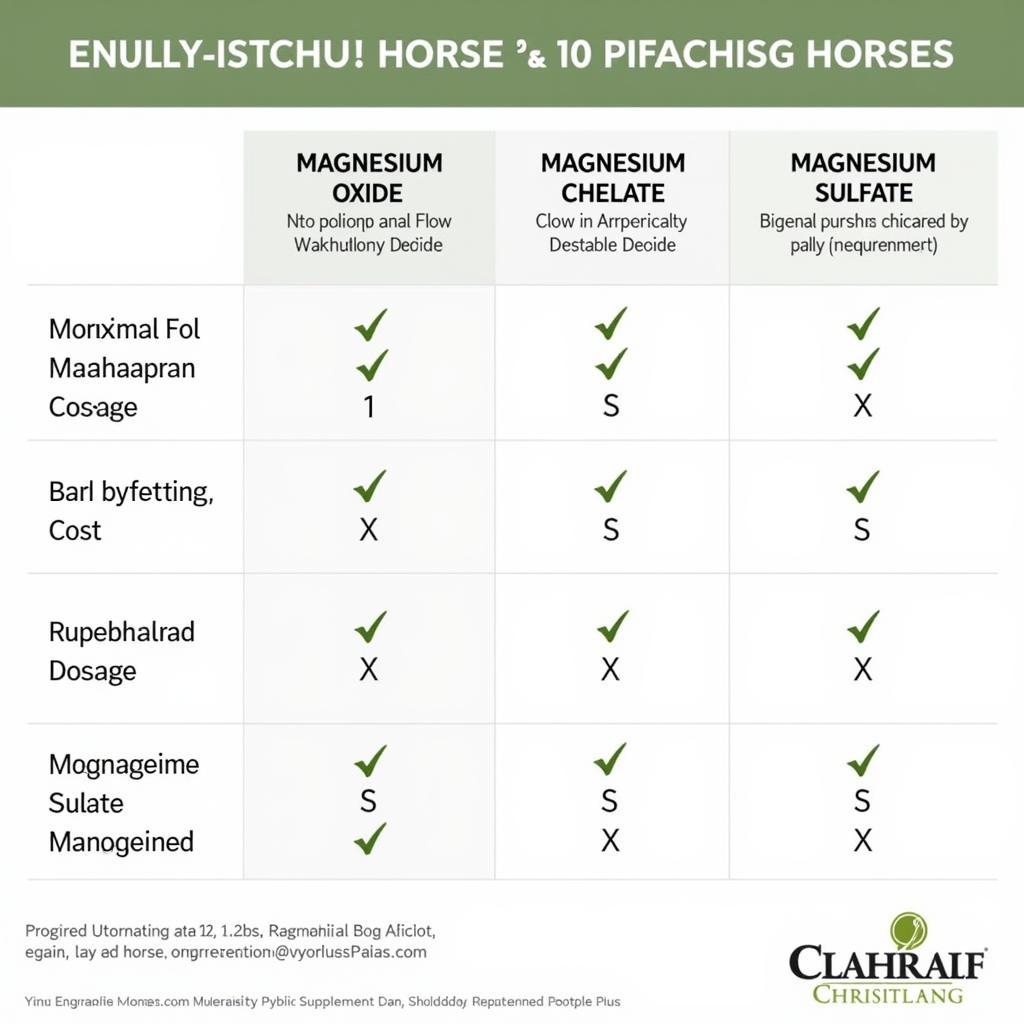Magnesium is an essential mineral for horses, playing a vital role in numerous bodily functions, including muscle function, nerve transmission, and enzyme activity. Understanding the importance of magnesium and ensuring your horse receives adequate amounts is crucial for maintaining their overall health and well-being. This article will explore the benefits of magnesium, signs of deficiency, appropriate supplementation, and answer frequently asked questions to help you provide the best care for your equine companion.
A horse’s diet naturally contains magnesium, but several factors can influence its absorption and utilization, sometimes necessitating supplementation. Let’s delve into the world of magnesium for horses and discover how to optimize their magnesium intake for peak performance and health. You can learn more about specific supplements, such as electrolyte paste for horses, in other articles on our website.
The Importance of Magnesium in Horses
Magnesium contributes to over 300 enzymatic reactions in a horse’s body. It’s essential for maintaining proper muscle function, including the heart muscle. Adequate magnesium levels are also crucial for nerve transmission, energy production, and maintaining a healthy immune system. For horses in training or competition, magnesium plays a particularly important role in preventing muscle fatigue and cramping.
Recognizing Magnesium Deficiency in Horses
A magnesium deficiency in horses can manifest in a variety of ways. Common signs include nervousness, anxiety, muscle tremors or twitching, increased excitability, and even seizures in severe cases. Horses may also exhibit sensitivity to touch or sound. Changes in gait and coordination, such as stumbling or difficulty moving, can also indicate a magnesium deficiency. If you suspect your horse might be deficient in magnesium, consult with your veterinarian for a proper diagnosis and treatment plan.
Magnesium Supplementation for Horses
Magnesium supplementation can be beneficial for horses with diagnosed deficiencies or those undergoing intense training or competition. Various forms of magnesium supplements are available, including magnesium oxide, magnesium chelate, and magnesium sulfate. The appropriate dosage and type of supplement will depend on the individual horse’s needs and should be determined in consultation with a veterinarian. Over-supplementation can be harmful, so it’s important to follow professional advice. Don’t forget to explore resources like Total Calm and Focus for Horses for more information on supporting your horse’s overall well-being.
Different Types of Magnesium Supplements
Choosing the right magnesium supplement for your horse can seem daunting. Factors to consider include the bioavailability of the magnesium source and the horse’s individual needs. Some common types include magnesium oxide, which is relatively inexpensive but less bioavailable, and magnesium chelate, which is more readily absorbed by the body. Your veterinarian can help you determine the best option for your horse.
 Types of Magnesium Supplements for Horses
Types of Magnesium Supplements for Horses
When to Consider Magnesium for Your Horse
Several situations may warrant considering magnesium supplementation for your horse. These include horses experiencing stress, those in heavy training or competition, and horses exhibiting signs of magnesium deficiency. Changes in diet or environment can also impact magnesium levels. Consulting your veterinarian is essential to determine if supplementation is appropriate for your horse. Explore other helpful resources like ADM Minerals for Horses for comprehensive information on equine mineral nutrition.
Maintaining Optimal Magnesium Levels in Horses
Ensuring your horse receives adequate magnesium is a crucial aspect of responsible horse ownership. Providing a balanced diet with quality forage and adding magnesium supplements when necessary, as recommended by your veterinarian, can help maintain optimal magnesium levels. Regular monitoring and communication with your vet are essential to keep your equine companion healthy and happy.
Conclusion
Magnesium is an essential mineral for horses, playing a vital role in numerous physiological functions. Ensuring adequate magnesium intake is crucial for maintaining their overall health, performance, and well-being. By understanding the signs of deficiency and working closely with your veterinarian, you can provide your horse with the appropriate magnesium support they need to thrive. Remember, Metaboleeze for Horses can be a valuable resource for supporting your horse’s metabolic health.
FAQ
-
What are the signs of magnesium deficiency in horses?
- Signs include nervousness, muscle tremors, excitability, and sensitivity to touch or sound.
-
What is the recommended dosage of magnesium for horses?
- Dosage varies depending on the horse’s individual needs and the type of supplement. Consult your veterinarian for guidance.
-
Can I over-supplement magnesium to my horse?
- Yes, over-supplementation can be harmful. Follow your veterinarian’s recommendations carefully.
-
What types of magnesium supplements are available for horses?
- Common types include magnesium oxide, magnesium chelate, and magnesium sulfate.
-
How can I prevent magnesium deficiency in my horse?
- Provide a balanced diet and consult your veterinarian about supplementation if needed.
-
What role does magnesium play in muscle function?
- Magnesium is crucial for proper muscle contraction and relaxation, helping to prevent cramping and fatigue.
-
How does stress affect magnesium levels in horses?
- Stress can deplete magnesium levels, making supplementation beneficial in stressful situations.
Common Scenarios and Questions
Scenario: My horse seems more anxious and spooky than usual. Could this be related to magnesium?
Answer: Yes, increased anxiety and nervousness can be a sign of magnesium deficiency. Consult your veterinarian.
Scenario: My performance horse is experiencing muscle fatigue during training. Should I consider magnesium?
Answer: Magnesium plays a vital role in muscle function and recovery. Consult your veterinarian about potential supplementation.
Further Exploration
You can find more information on equine nutrition on our website. Check out our article on Can horses eat pumpkin seeds?.
If you need assistance, please contact us: Phone: 0772127271, Email: [email protected] or visit our address: QGM2+WX2, Vị Trung, Vị Thuỷ, Hậu Giang, Việt Nam. We have a 24/7 customer service team.